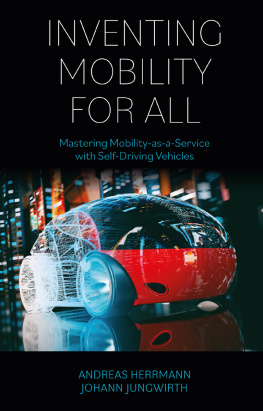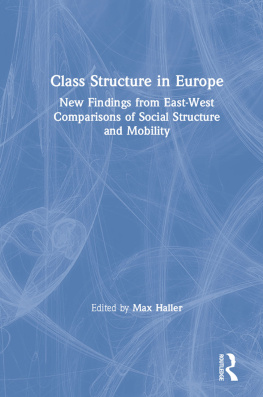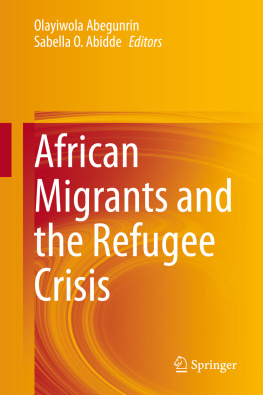FINDING WAYS THROUGH EUROSPACEEdited by Noel B. Salazar, KU Leuven, in collaboration with AnthroMob, the EASA Anthropology and Mobility Network
This transdisciplinary book series features empirically grounded studies from around the world that disentangle how people, objects and ideas move across the planet. With a special focus on advancing theory as well as methodology, the series considers movement as both an object and a method of study.
Volume 7
FINDING WAYS THROUGH EUROSPACE
West African Movers Re-viewing Europe from the Inside
Joris Schapendonk
Volume 6
BOURDIEU AND SOCIAL SPACE
Mobilities, Trajectories, Emplacements
Deborah Reed-Danahay
Volume 5
HEALTHCARE IN MOTION
Immobilities in Health Service Delivery and Access
Edited by Cecilia Vindrola-Padros, Ginger A. Johnson and Anne E. Pfister
Volume 4
MOMENTOUS MOBILITIES
Anthropological Musings on the Meanings of Travel
Noel B. Salazar
Volume 3
INTIMATE MOBILITIES
Sexual Economies, Marriage and Migration in a Disparate World
Edited by Christian Groes and Nadine T. Fernandez
Volume 2
METHODOLOGIES OF MOBILITY
Ethnography and Experiment
Edited by Roger Norum, Alice Elliot and Noel B. Salazar
Volume 1
KEYWORDS OF MOBILITY
Critical Engagements
Edited by Noel B. Salazar and Kiran Jayaram
Finding Ways through Eurospace
West African Movers Re-viewing Europe from the Inside
Joris Schapendonk
First published in 2020 by
Berghahn Books
www.berghahnbooks.com
2020 Joris Schapendonk
All rights reserved. Except for the quotation of short passages for the purposes of criticism and review, no part of this book may be reproduced in any form or by any means, electronic or mechanical, including photocopying, recording, or any information storage and retrieval system now known or to be invented, without written permission of the publisher.
Library of Congress Cataloging-in-Publication Data
Names: Schapendonk, Joris, author.
Title: Finding ways through Eurospace : West African movers re-viewing Europe from the inside / Joris Schapendonk.
Description: New York : Berghahn Books, 2020. | Series: Worlds in motion ; volume 7 | Includes bibliographical references and index.
Identifiers: LCCN 2020006095 (print) | LCCN 2020006096 (ebook) | ISBN 9781789206807 (hardback) | ISBN 9781789206814 (ebook)
Subjects: LCSH: West Africans--European Union countries--Social conditions. | West Africans--Cultural assimilation--European Union countries. | Immigrants--European Union countries--Social conditions. | Transnationalism--European Union countries. | European Union countries--Boundaries--Social aspects. | Africa, West--Emigration and immigration. | European Union countries--Emigration and immigration.
Classification: LCC D1056.2.A38 S35 2020 (print) | LCC D1056.2.A38 (ebook) | DDC 305.896/604--dc23
LC record available at https://lccn.loc.gov/2020006095
LC ebook record available at https://lccn.loc.gov/2020006096
British Library Cataloguing in Publication Data
A catalogue record for this book is available from the British Library
ISBN 978-1-78920-680-7 hardback
ISBN 978-1-78920-681-4 ebook
Contents
Acknowledgements
In this book you will probably get lost at some point. The storyline frequently moves between settings and places and often shifts in time and between people. I have long doubted whether I should provide more cartographic hints on where you are in space and time. In the end, I decided not to do so. The main reason is that there is a world out there that cannot be pinned down, that lacks a clear scale and that does not follow pregiven maps. Thus, when you do get lost, you should not worry. It is part of the argument and soon a new passage will follow that will give you new directions.
This book is based on dialogues and engagements with multiple people whose real names are not used. You will know when it is about you. First and foremost, I am grateful for your time and energy, your trust and guidance, your questions, reflections and stories. May your pathways unfold in ways you like.
The book is a collection of findings from my Veni grant by the Netherlands Organisation for Scientific Research (NWO). I express my gratitude to my close colleagues at the Radboud University Nijmegen, and in particular to Kolar Aparna (my critical sister) and Roos Hoekstra-Pijpers, who commented on an early version of this manuscript. I am grateful to Marisha Maas for her incredibly close readings and careful language editing that continued in very hectic times. Without you, this book would not have been published the way it is. In addition, I value very much the input and reflections on my work of other Nijmegen people, most notably Lothar Smith, Olivier Kramsch, Henk van Houtum, Martin van der Velde, Tine Davids, Tineke Strik, Rianne van Melik, Ton van Naerssen, Cesar Merlin, Federico Alagna and Mirjam Wajsberg (although the last two are not often in Nijmegen). I owe special thanks to Huib Ernste for his continuous support within the Department of Human Geography, but also for inviting key scholars to our borderland for engaged discussions and thought-provoking lectures. Moreover, it was a real privilege to work in this research with talented students including Michelle Brugman, Saskia van Ooijen, Peter Teunissen, Iris Poelen, Marieke Ekenhorst, Bram Bos, Carla Longares, Thomas Noten, Laura Guenther, Johanna Longerich and, last but not least, Fransesco Branchi, who sadly lost his life before he could finish his project. Fransescos thoughts, however, resonate in the chapters to come.
Outside Nijmegen, I am grateful to Janine Dahinden, Matthieu Bolay, Sophie Cranston, Derek Gregory, Adrian Favell, Daniela de Bono, Charles Heller, Xavier Ferrer Gallardo, Griet Steel, Inga Schwarz and Bruno Riccio, for their insightful comments on my work and/or our recent inspiring dialogues. I would like to thank the Helping Hand Research Network, coordinated by Marie Sandberg and Dorte Andersen, for raising new questions that helped me to explore other fields, thoughts and places. I am grateful as well to the wonderful people (most notably Maggi Leung, Ilse van Liempt, Annelies Zoomers and Gery Nijenhuis) of the Transmobilities Network, which keeps the dialogues on mobility going. I also value very much my recent discussions with Valentina Mazzucato, Joan van Geel and others from the Globalisation, Transnationalism and Development research group of Maastricht University. All these people have directly and indirectly left their traces in this book.
Finally, I owe my thanks to my lovely family whom I have left behind so many times on my field trips in the past four years. Thank you, Jolle, for absolutely everything. And thank you both, Polle Mo and Noes, for bringing even more movement into our lives.
Abbreviations
| CAS | Centri Accoglienza Straordinaria (Extraordinary Reception Centres, Italy) |
| CDA | Centri di Accoglienza (Collective Reception Centres, Italy) |






